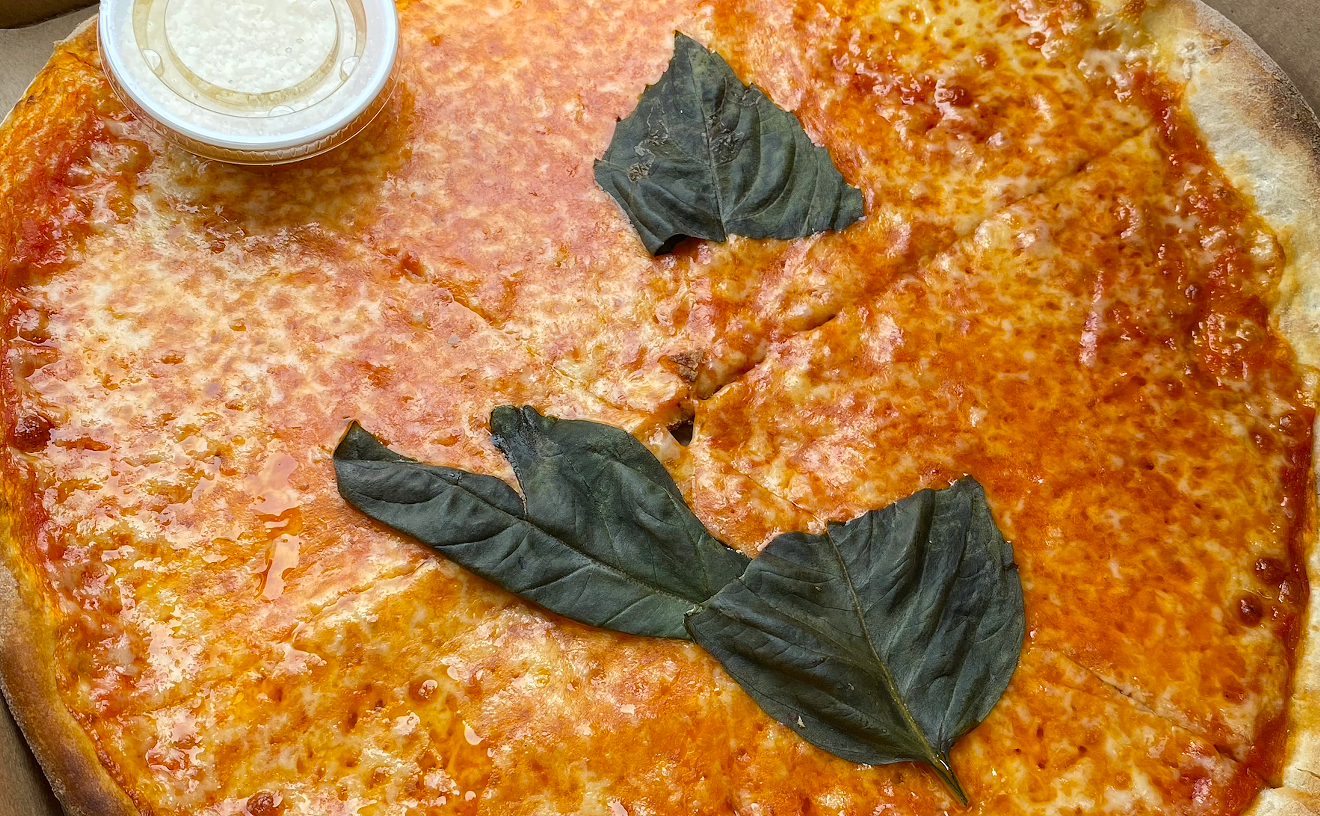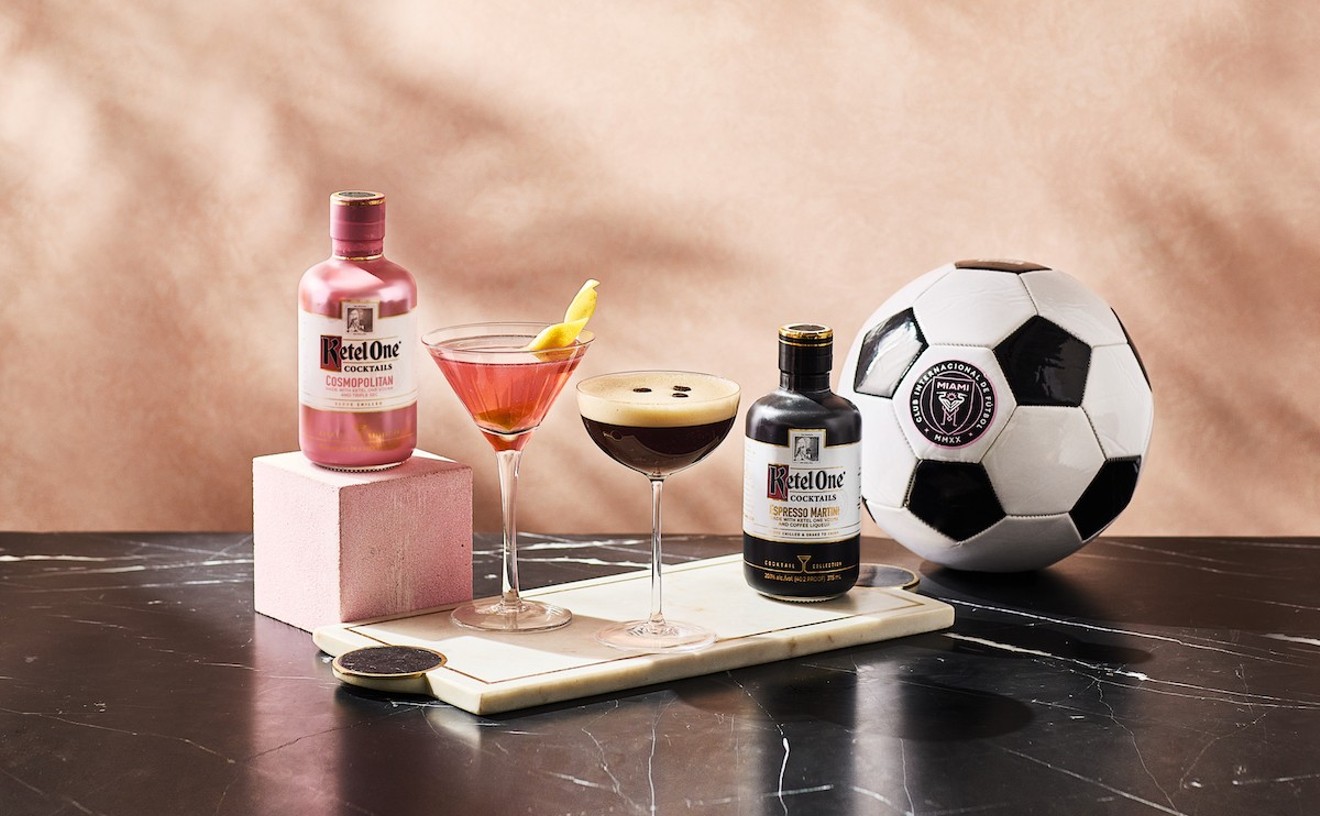That was seven years ago. As we know, things didn't quite work out as planned. Not only has CityPlace failed to flourish but in the very act of limping along, it's also managed to draw business away from West Palm's main street, Clematis. The number of restaurants that have opened and closed both downtown and at CityPlace since the complex opened in 2000 is mind-boggling, dozens and dozens. A few stalwarts have hung on — the Cheesecake Factory is still there, and Brewzzi and Legal Seafoods seem to be holding their own — but for the most part, the revolving door has been spinning off its hinges.
I'm amazed that any restaurateur has the temerity to set up shop at CityPlace, given its track record in failure. Still, some do. The latest is Jinja Bar and Bistro, on the second floor next to Blue Martini, the Comedy Club, and the Muvico Palace, a sweet location for a casual, inexpensive eatery with a full liquor bar; it's date-night ground zero. This small chain out of New Mexico (the West Palm operation is its fourth restaurant) replaces a popular, moderately priced Mexican joint that ought to have done well in the same space; that one came and went so fast that I never had a chance to check it out. Its replacement, Jinja (the name, with its English associations of ginger and ninja, is the Japanese word for a shrine), is selling "pan-Asian" food. But no sushi — for that, you can walk a couple of doors down to its direct competition, Saito's Japanese Steak House. Owners Tom and Lesley Allin and Doug Lanham, inveterate globetrotters, say they've adapted the menu to American tastes based on favorite dishes they found in Japan, China, Thailand, Vietnam, Malaysia, and Singapore.
Asian travel circa 1940 is the theme — the walls are decorated with vintage airline posters, and the bar serves retro Polynesian cocktails — mai tais, Singapore slings, and zombies. The big, bilevel space is dark and relaxing indoors, livelier on the patio — real orchids everywhere, inverted Chinese parasols, wooden booths strewn with pillows, paddle fans. A soothing sound system plays nostalgic jazz standards at a bearable volume.
I reluctantly admit that I felt something like sweet relief the weekend night we showed up at Jinja without a reservation and were swept inside by a series of hostesses. Jinja, it must be said, is not the kind of restaurant I'd normally gravitate toward. The menu and aesthetic are aimed squarely at the middle — though certainly youthful enough in the simple, spicy dishes, the bowls of chow fun noodles and pad Thai, the pot stickers and Japanese crab cakes, to offer a little good, semiexotic fun at low prices. But real aficionados of Eastern fare had better steer clear; you're not going to find shark-fin soup or jellyfish on this menu. The distinguishing characteristics of these very different cuisines — the subtlety of Vietnamese herbs, the pungency of Sichuan spices, the inexplicable fruits of Malaysia — have been rubbed gently away by corporate pressures to make a kind of virtual Asian culinary landscape. It tastes fine. It's pleasant to wander through. But it's not real.
The relief I was feeling, I realized, came from the ease of the experience. There was no pressure in this setting to put on airs. We hadn't had to fight for a reservation or stand in line or wander around holding a beeper; we hadn't been obliged to drink too many mai tais at a packed bar while we waited for a table. The servers, hostesses, and managers smiled, stopped by to chat, checked back with us, made us feel welcome. There were no unfamiliar terms on the menu. The music soothed. The place was clean. We gathered that we were going to get in and out for about $65 for two of us with tip.
It hit me then how stressful dining out can be. OK, I have perspective: On the horror scale, going out for a meal doesn't approach any extremes of human suffering. But often, the food turns out to be dizzyingly overpriced or the servers are mean to you or the bathroom is filthy or the food just plain doesn't taste good — it's a wonder so many of us go out to eat at all, weekend after weekend. Whether through smarts or experience, the owners of Jinja seem to have realized that they have the power to smooth out the common rough edges of restaurant dining. They're not aiming to give you a peak experience, maybe, but they'll damned sure give you one that doesn't ruin your mood, your appetite, or your prospects.
I liked it. If I happened to be wandering around CityPlace after a movie with 20 bucks burning a hole in my pocket, I'd drop back in for a bowl of chicken udon noodles ($9.95) or a glass noodle togarashi tuna salad with seaweed ($10.25) — Jinja is open until midnight on weekends, expanding our late-night options by a hair. The Vietnamese crispy chicken spring rolls we sampled ($6.25) were tasty and filling, though they had none of the popping flavors or ethereal lightness of authentic Vietnamese cuisine — they were more like Chinese egg rolls with nuac cham. Everything tends to run together in a vague approximation of "Asia" — there's kung pao chicken served "Thai style" ($14.95) or the Vietnamese "shaking beef" we had ($17.95) of wok-seared beef tenderloin with wilted spinach, caramelized onions, and vegetable fried rice. It came out hot, carried in the competent arms of a pleasant and cheerful server; it tasted good; it was cheap and filling — and no doubt the 20-somethings hanging at the bar and lounging at the tables thought so too.
The same was true of our Szechuan salmon ($15.95). If the fish itself was a shade on the dry side and the chili sauce draping the snow peas and red peppers — although hot, hot, hot! — lacked much depth or complexity, a hungry girl couldn't complain. The plate came with a couple of Chinese sweet steamed bean buns, long ago my default snack of choice, and I still love them.
I can't say much for our dessert — molten chocolate cake with a strange, jellylike texture at the center ($4.95), but we liked the "Vietnamese coffee ice cream" that came with it. On second thought, I should have ordered the coconut mango tapioca pudding ($4.95).
Can Jinja make it? I'm rooting for the place — so far, it's fighting the good fight. If it keeps serving decent food at low prices with this level of hospitality, it might just outwit the CityPlace curse.










